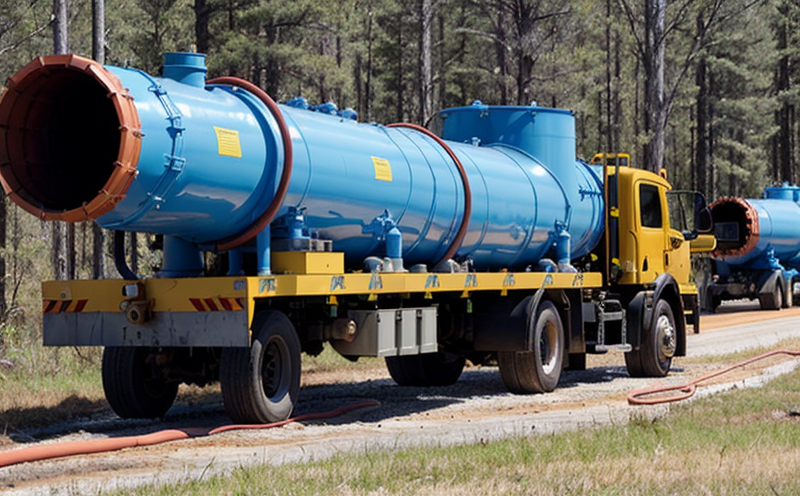ISO 6975 Sulfur Content Testing in Natural Gas
The ISO 6975 standard provides a method to determine the total sulfur content in natural gas. This is critical for ensuring the safety and efficiency of natural gas distribution systems, pipelines, and end-user appliances. The testing procedure outlined by this international standard is designed to detect both mercaptans (organic sulfides) and non-metalliferous sulfur compounds.
The process begins with sample collection from various points within the natural gas pipeline network. Samples are typically collected using a certified sampling device, ensuring that they represent the overall composition of the natural gas stream accurately. Once collected, samples undergo rigorous pre-processing steps to ensure homogeneity and minimize contamination risks. These steps may include degassing, filtration, and dilution if necessary.
The actual testing process involves several key stages: preparation, analysis using either colorimetric or instrumental methods (such as gas chromatography), and calculation of results based on the standard's specified criteria. It is essential that all equipment used adheres strictly to ISO 6975 guidelines to maintain accuracy and consistency across different laboratories.
The importance of accurate sulfur content measurement cannot be overstated, particularly given its direct relationship with corrosion rates in pipelines and associated infrastructure. Excessive sulfur can lead to significant degradation over time, resulting in costly repairs or replacements. By adhering closely to ISO 6975 standards, operators ensure compliance with regulatory requirements while also protecting their assets.
Compliance with these international regulations is not just about meeting legal obligations; it's a proactive approach towards maintaining reliability and safety throughout the entire supply chain. Regular testing helps identify potential issues early on, allowing for timely interventions before they escalate into larger problems. This preventive maintenance strategy ultimately leads to longer-lasting infrastructure and reduced downtime.
Furthermore, accurate sulfur content measurement plays a crucial role in optimizing combustion processes at end-user facilities like power plants or residential heating systems. By ensuring that the fuel contains an appropriate level of sulfur, operators can enhance efficiency without compromising on safety standards. This balance between performance enhancement and risk management underscores why ISO 6975-compliant testing remains indispensable.
As technology continues to evolve within the energy sector, so too do the tools available for conducting such tests. Modern instrumentation offers faster turnaround times alongside improved precision compared to traditional methods. However, despite these advancements, adherence to established standards like ISO 6975 ensures consistency and comparability between different testing facilities worldwide.
In conclusion, implementing ISO 6975 sulfur content testing in natural gas distribution networks is essential for maintaining both operational integrity and public safety. Through meticulous sample preparation, precise analytical techniques, and strict adherence to international standards, this service delivers reliable data that informs critical decision-making processes across industries ranging from utilities management to research & development.
Benefits
The implementation of ISO 6975 sulfur content testing in natural gas distribution networks offers numerous advantages for stakeholders involved at every stage of the supply chain. Here are some key benefits:
- Enhanced Safety: Reduced risk of pipeline corrosion due to accurate monitoring and management of sulfur levels.
- Improved Efficiency: Optimized combustion processes enhance energy production capabilities while minimizing waste generation.
- Regulatory Compliance: Ensures adherence to international standards, thereby avoiding penalties associated with non-compliance.
- Prolonged Infrastructure Lifespan: Early detection of potential issues helps in timely intervention, extending the useful life of assets significantly.
- Economic Savings: Preventive measures reduce costs related to unplanned maintenance and repairs by addressing problems before they become critical.
In addition to these tangible benefits, ISO 6975-compliant testing also contributes positively towards broader sustainability goals. By minimizing environmental impacts through reduced emissions and optimized resource utilization, this service aligns well with current trends toward greener practices in the energy sector.
Environmental and Sustainability Contributions
The practice of ISO 6975 sulfur content testing in natural gas distribution networks contributes significantly to environmental sustainability by reducing greenhouse gas emissions and promoting efficient resource utilization. By maintaining optimal sulfur levels, operators can minimize the formation of harmful compounds like sulfur dioxide (SO₂), which is known to contribute to air pollution.
- Reduced Emissions: Lowering sulfur content helps decrease SO₂ emissions, thereby improving local air quality and reducing respiratory health issues.
- Energy Efficiency: Optimizing combustion processes leads to higher thermal efficiencies, which in turn reduces overall energy consumption. This contributes positively towards lowering carbon footprints across various sectors relying on natural gas for heating or power generation.
In addition to these direct environmental benefits, ISO 6975-compliant testing also supports broader sustainability initiatives by fostering responsible resource management practices within the industry. Through continuous monitoring and adjustment of sulfur content levels, operators can ensure that their operations remain aligned with evolving environmental regulations and best practices worldwide.
Competitive Advantage and Market Impact
Implementing ISO 6975 sulfur content testing provides significant competitive advantages for businesses operating within the natural gas distribution industry. These include enhanced reputation among customers, improved operational efficiency, reduced downtime, and better alignment with international standards.
- Increased Reputation: Demonstrating commitment to safety and environmental responsibility enhances customer trust and loyalty, which is crucial in today’s market where social responsibility is increasingly valued by consumers.
- Better Operational Efficiency: By identifying potential issues early through regular testing, operators can implement corrective actions promptly, reducing the likelihood of unexpected disruptions or failures.
- Reduced Downtime: Early intervention allows for targeted maintenance activities that prevent larger-scale breakdowns and associated delays in service provision.
- Better Compliance: Adherence to international standards ensures that all operations meet stringent quality assurance criteria, thus avoiding costly penalties or legal challenges.
In terms of market impact, businesses that adopt ISO 6975-compliant practices are better positioned to capture new opportunities arising from growing demand for cleaner energy solutions. As global efforts towards carbon reduction intensify, those who demonstrate leadership in environmental stewardship will likely gain significant competitive advantages over their peers.





